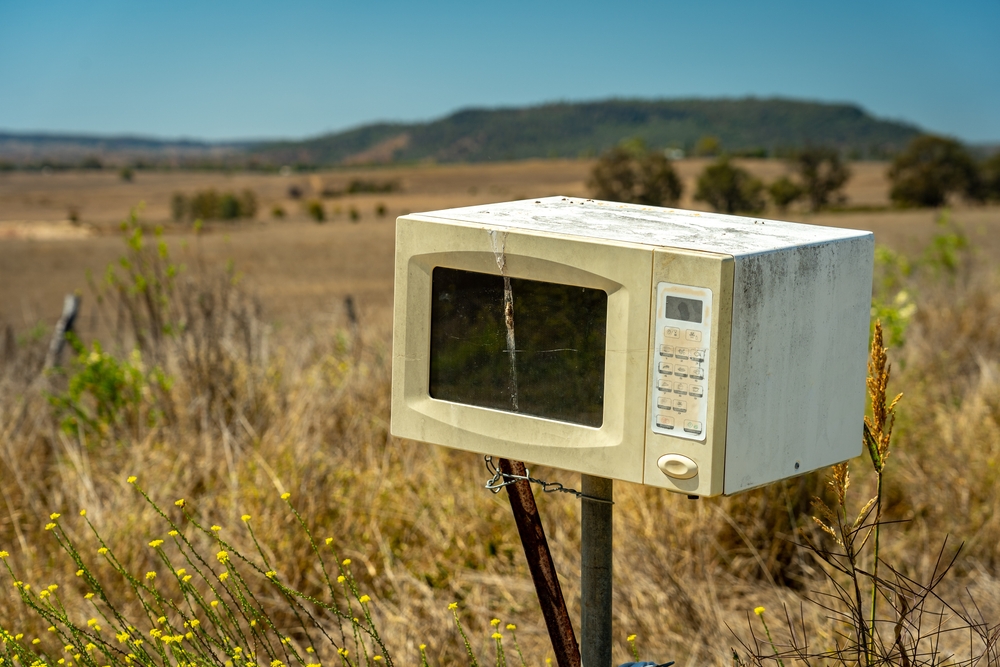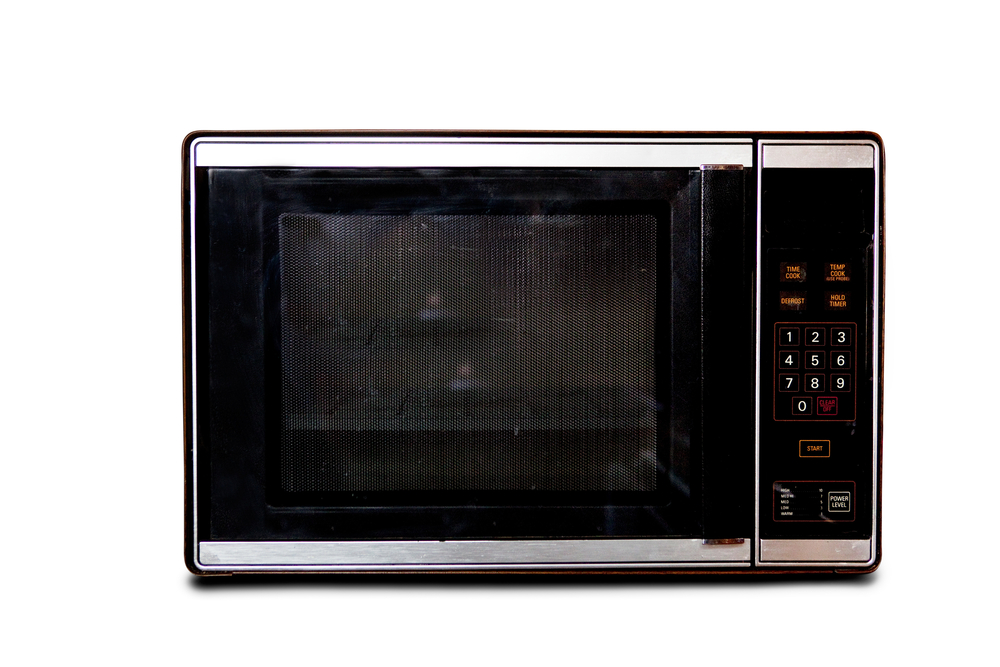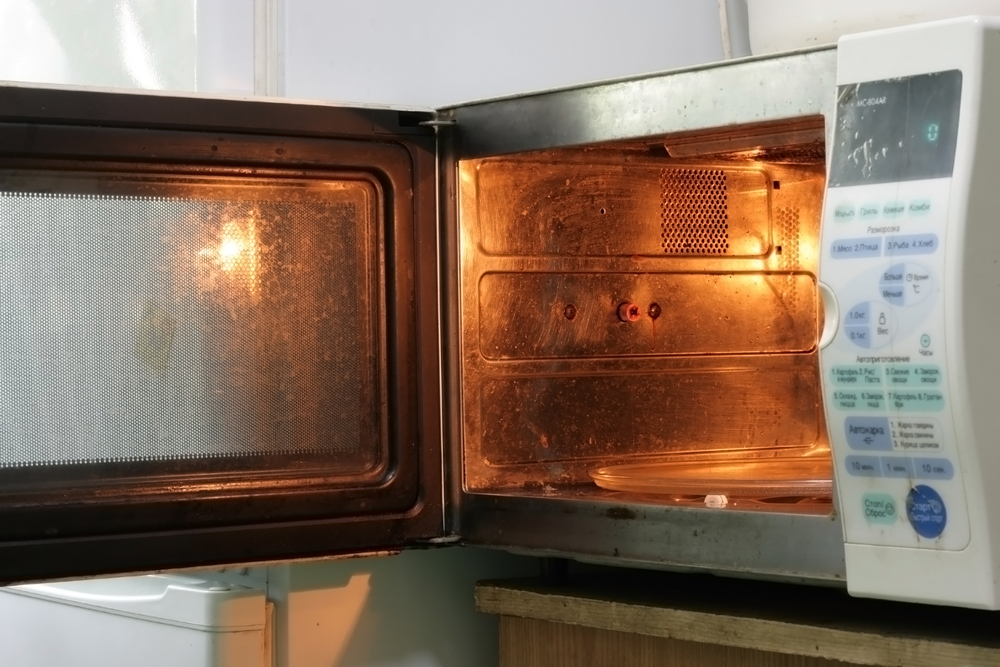Microwave ovens are one of the most popular appliances, appearing in over 90 percent of U.S. homes. As such, many people don't realize that microwaves don't last forever, even if it feels like they do.
Knowing when to replace your microwave oven is essential to your safety and sanity if you rely on it a lot. We'll talk about how to tell whether you should repair or replace your microwave and the warning signs that your beloved kitchen appliance is coming to the end of its lifespan.

This Microwave Oven Has Quite Literally Been Put Out to Pasture and is Now a Mailbox
Most people agree that you should replace your microwave every ten years. Of course, you may need to replace it sooner if you notice signs that it's not working well anymore. Some brands may last longer than others too. For instance, General Electric (GE) microwaves are known to last up to ten years and often longer.
There are several reasons why you'd need to replace your microwave before its lifespan is up. The main reason this appliance will die sooner than you may think it will is overusing it. The more often you cook with your microwave, the faster it will die.
Many people don't know what to look for when their microwave is dying. Luckily, this article will discuss the things you can look out for.
There are seven signs that will help you know when to replace a microwave oven, or at least know if it is on its way out. The first is how old it is. If it's over ten years old, it's more than likely near the end of its useful life. But age isn't the only indicator that it's time to replace microwave ovens. Other ways to tell if your microwave is dying is if:
Smoking and sparking microwaves can be alarming. These signs can often lead to small house fires. So, if you see these, you need to stop using your microwave immediately. According to the National Fire Protection Agency, these appliances cause about 4% of all house fires associated with cooking.
While this number is relatively low compared to other cooking fires, no one wants to experience this, and it's easily preventable if you can watch for the warning signs.
If you experience one or more of these warning signs with this appliance, it's time to consider a new microwave.
When your microwave is causing you problems, it doesn't mean you immediately need to replace it. You might be able to repair simple issues that this appliance has. If you experience any of the above, you should consider replacing it instead of repairing it.

This Vintage Microwave is a Candidate to Be Replaced
An easy and common microwave repair is changing a faulty lightbulb. It’s likely the lightbulb will go out before the microwave does. You can purchase light bulbs for reasonable prices and replace them yourself without hiring a professional.
The door not closing correctly can warrant a repair or replacement depending on a few situations. If the door isn't locking correctly, but there are no other issues with your appliance, then repairs are worth it. If the door doesn't close correctly and other signs accompany that it's dying, then replacement is best.

While Technical Issues May a Reason for Microwave Replacement - Hygiene Issues May be a Factor as Well
The cost of a microwave oven repair will vary. On average, repairs cost anywhere from $50 to $400 according to Angi.com. This includes parts and labor. Most microwaves aren’t all that expensive, so it may be possible that the cost of repair is higher than the value of your microwave. Evaluating how much the repairs will cost can help you determine whether it's worth it to buy a new microwave or spend money on costly repairs.
Since you can get affordable microwaves for under $50 at most big-box stores, you may be more interested in purchasing a new one. On the other hand, if you have an expensive and high-quality microwave, you may want to try repairs first before replacing it.
A critical factor in how much it will cost to repair your microwave is if you're doing it yourself or hiring a professional. You can save money by doing it yourself, but hiring a professional for any appliance repair is almost always a better choice for safety reasons.
Rest assured that microwaves are generally one of the more affordable appliances to repair. Microwave repair parts tend to be cheaper than dishwasher parts or parts for convection ovens.
Most people lump microwaves and convection microwaves into the same category, and for the most part, they're very similar. Convection microwaves have all the same abilities as a traditional microwave, but they also have an additional fan to help cook food using different methods.
They can bake, roast, and crisp, while a traditional microwave will heat food using radiation heat transfer. If you have a convection microwave oven, you still need to replace your microwave every seven to ten years.
As convection microwave ovens have more features and capabilities than standard microwave ovens, they also come with additional components: a heating element and a fan to circulate hot air and allow even cooking. Additional features, parts and capabilities can result in more expensive repair costs.
If you still have questions about when to replace your microwave oven, here are some of the most frequently asked questions that can give you some insight.
It depends. Most people need to replace their microwave once they reach seven to ten years old. But if you've taken care of your microwave that's 20 years old and there are no signs that it's dying, then you don't have to replace it. If you notice signs your microwave is dying, you need to replace it sooner than later.
Yes. All microwaves and other appliances tend to get weaker as they age. If you have a vintage microwave that you've taken excellent care of, it may still work. However, it likely doesn’t work as well as when you first purchased it.
A toaster oven is an outstanding appliance to use in addition to a microwave. Think again if you're interested in one because you think it will last longer than a microwave. Most manufacturers recommend replacing your toaster oven every five years.
Radiation has a negative connotation, but microwaves use radiation to help cook your food or reheat it. Luckily, the amount of radiation that microwaves use is deemed safe according to the FDA and won't cause cancer like severe radiation from other sources.
